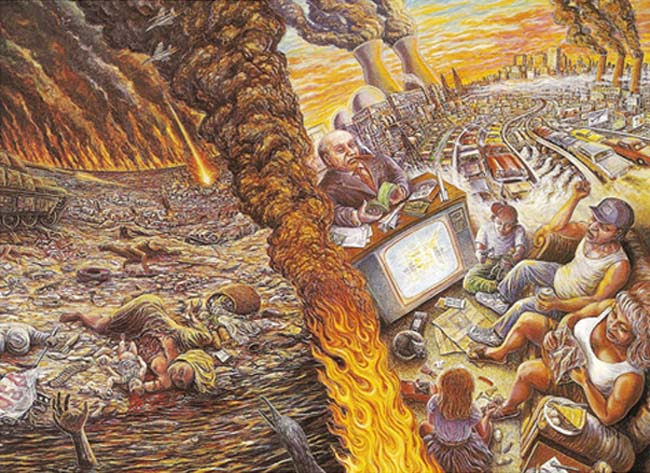Table of Contents
Overview:
- ENERGY
- Petroleum, as a cheap source of energy, has been the key ingredient to the growth and development of our current industrial age. Petroleum, however, is a nonrenewable, finite natural resource. The word "finite" needs emphasis here. Current estimates suggest petroleum production will soon peak and be priced out of common use. As our economy and our production of food are critically dependent on cheap oil, we must either find a new way to produce clean efficent energy or moderate the way we live. MORE.
Related Articles:
- SEARCHING FOR A MIRACLE
- This report by Richard Heinberg is number four in the False Solutions series published since 2006 by the International Forum on Globalization. It is intended as a non-technical examination of a basic question: Can any combination of known energy sources successfully supply society's energy needs at least up to the year 2100?
- THE HIRSCH REPORT: Peaking of World Oil Production
- This is the landmark report by the United States Government on peak oil–impacts, mitigation, and risk management.
- WORLD OIL CRUNCH LOOMING?
- SCIENCE MAGAZINE enters the peak oil discussion. This article in their November 21st, 2008 issue may have been long overdue, but SCIENCE is one of the most respected scientific journals in the world; that they have decided to delve the realm of peak oil marks an important step for academic science.
- THE BACKGROUND IS OIL
- This is Dale Allen Pfeiffer's classic on Peak Oil.
- THE GREEN WHITE HOUSE
- What if the United States got serious about energy? What if Congress really took on climate change? What if the White House included cutting edge energy design and environmental awareness? Here's one man's vision for what 1600 Pennsylvania Avenue might look like.
- COMMON SENSE AND FOSSIL FUEL MANAGEMENT
- We've used up about half the planet's petroleum reseres. Environmental studies and foreign policy both scream for us to find alternatives. Instead we use more and more oil each day. From one petrol-addict to another, when in the world do we stop this nonsense of burning fossil fuels like there's no tomorrow?
- REVISITING THE LIMITS OF GROWTH: Could the Club of Rome have been correct, after all?
- This is an energy policy white paper written in October of 2000 by Matthew R. Simmons. In the next year, Simmons would be a member of the Bush-Cheney Energy Transition Advisory Committee and the Independent Task Force on Strategic Energy Policy. Let there be no doubt that peak oil was a critical part of all energy discussion in the Cheney-Bush White House. Video Clip: Matthew Simmons on CNBC 3/7/2008
- PEAK OIL:The Real Connection between Iraq and 9/11
- Explore the world of Peak Oil through the eyes of Mark Robinowitz.
- DESCENDING THE OIL PEAK
- In March of 2007, the Portland, Oregon City Council published a report on Peak Oil. This report lays out a comprehensive plan for preparing Portland for rising energy costs. For anyone interested in finding out more about Peak Oil, what it means economically, and how we might prepare for it, reading this report is a good place to start.
- THE WILLAMETTE VALLEY: THROUGH THE LENS OF PEAK OIL
- The price of a barrel of petroleum topped $145 in June of 2008, but dropped below $40 by the first week of 2009. The price climbed back to $75-80 range by the end of 2009 and held there almost all of 2010. It topped $100 during the spring and summer of 2011, then fell to $80 in the fall. Now as we enter the winter of 2014, it's in the $65-75 range. What does this volatility mean? It's the limits of growth beginning to show. We are witnessing the first tremors of economic adjustment. An age of extravagant waste is coming to an end. We are entering a period of economic recession directly connected to long-term natural resource mismanagement. What does this mean to those of us who live in Oregon's Willamette Valley? What can we do individually and collectively to prepare for the inevitable socio-economic changes? This portion of the Mud City Press website contains a collection of essays and articles that try to answer these questions.
- TAR SANDS VERSUS CLEAN WATER
- This excellent article by Mark Robinowitz explains why tar sands are not the answer.
Many of the essays, stories, and reviews at Mud City Press are formated as ADOBE PDF files. If you don't have ADOBE's Acrobat Reader on your computer, you may download their free software at the ADOBE website.

